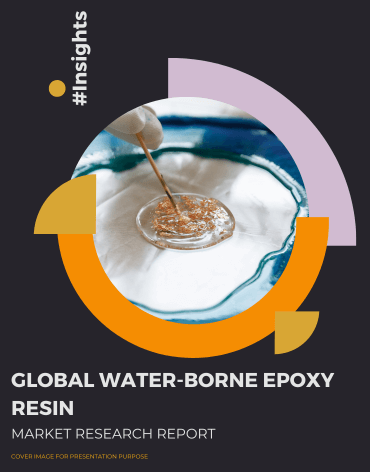Waterborne Epoxy Resin Market Set to Achieve $1.71 Billion by 2029

The Waterborne Epoxy Resin Industry is a sector within the broader chemicals and coatings industry that focuses on producing and utilizing waterborne epoxy resins. Epoxy resins are versatile and widely used synthetic materials valued for their strong adhesive properties, excellent mechanical strength, and resistance to chemicals and corrosion. Traditionally, epoxy resins are mixed with organic solvents to create coatings, adhesives, and other products. However, growing environmental concerns and regulatory pressures related to volatile organic compound (VOC) emissions have driven the development of waterborne alternatives.
Waterborne epoxy resins are an epoxy formulation that replaces organic solvents with water as the primary carrier. This makes them more environmentally friendly and less harmful to human health than solvent-based epoxy resins. The waterborne epoxy resin industry has gained prominence due to its ability to provide high-performance coatings and adhesives while significantly reducing VOC emissions and potential health risks associated with solvent exposure.
1 . Key Aspects of the Waterborne Epoxy Resin Industry
Production: Manufacturers synthesize waterborne epoxy resins by modifying traditional solvent-based epoxy formulations to make them compatible with water. This involves developing emulsions or dispersions of epoxy resin particles in water using suitable emulsifiers or surfactants.
Applications: Waterborne epoxy resins find applications across various industries, including:
- Coatings: They are used in protective coatings for metals, concrete, and other surfaces due to their exceptional adhesion, corrosion resistance, and durability.
- Adhesives: Waterborne epoxy adhesives are employed in the automotive, aerospace, electronics, and construction industries, offering strong bonding capabilities and improved environmental safety.
- Composites: Waterborne epoxy resins can also be used as matrix materials in producing fiber-reinforced composites, providing high strength and stiffness to the resulting products.
Environmental Benefits: The primary advantage of waterborne epoxy resins is their reduced environmental impact. They have significantly lower VOC emissions, which helps comply with strict environmental regulations. Their lower toxicity and flammability also contribute to safer working conditions for industry personnel.
Challenges: Despite their advantages, waterborne epoxy resins may have limitations, including potentially longer drying times and decreased chemical resistance compared to solvent-based epoxy systems. However, ongoing research and development aim to address these challenges and enhance the performance of waterborne formulations.
Market Trends: The increasing awareness of environmental issues and the shift towards sustainable practices have fueled the growth of the waterborne epoxy resin industry. Consumers, regulatory bodies, and industries seek alternatives to traditional solvent-based products, driving innovation and investment in waterborne technologies.
Research and Development: The industry continuously invests in research to improve waterborne epoxy resins' performance, compatibility, and versatility. This includes enhancing their mechanical properties, chemical resistance, and applicability to a wider range of substrates.
2 . Waterborne Epoxy Resin Market Size
3 . Waterborne Epoxy Resin Types
Anionic Resin and Cationic Resin are two ion exchange resins used in various industrial and scientific applications for their ability to exchange ions with surrounding solutions selectively. These resins are essential in water purification, chemical separations, and other applications where ion removal or exchange is crucial. Let's delve into each type:
Anionic Resin: Anionic resins are a class of ion exchange resins with a positively charged functional group known as quaternary ammonium attached to their polymer structure. This positively charged group attracts and selectively binds negatively charged ions, or anions, from a solution, effectively removing these ions from the surrounding solution. Common applications of anionic resins include:
- Water Treatment: Anionic resins remove anions like sulfate, nitrate, and chloride from water sources, contributing to water softening and purification processes.
- Wastewater Treatment: They can remove undesirable anions and contaminants from industrial wastewater streams.
- Deionization: Anionic resins are used in ion exchange processes to achieve deionized water, which is essential in various laboratory and industrial settings.
Cationic Resin: Cationic resins, conversely, feature a negatively charged functional group known as a sulfonic acid group attached to their polymer structure. This negatively charged group attracts and selectively binds positively charged ions, or cations, from a solution. Cationic resins have applications such as:
- Water Softening: Cationic resins remove calcium, magnesium, and other metal cations responsible for water hardness in residential and industrial settings.
- Ion Exchange Chromatography: They are widely used in analytical and preparative chromatography to separate and purify cations based on their charge and size.
- Industrial Processes: Cationic resins are utilized in various industrial processes to capture specific metal ions from solutions, aiding in metal recovery and purification.
4 . Waterborne Epoxy Resin Applications
Waterborne epoxy resins are versatile materials that find application in various industries due to their environmentally friendly nature and strong adhesive properties. Here's how waterborne epoxy resins are used in the mentioned industries:
Engineering:
- Coatings and Paints: Waterborne epoxy resins are used to create protective coatings and paints for structures such as bridges, buildings, and industrial equipment. These coatings provide corrosion resistance and durability to extend the lifespan of structures.
Automotive (Car):
- Primer and Base Coats: Waterborne epoxy resins are used in automotive coatings, particularly in primer and base coats. They provide excellent adhesion to the vehicle's surface, enhance paint durability, and contribute to the overall appearance.
Aerospace:
- Aircraft Coatings: Waterborne epoxy resins are utilized for aircraft coatings, including exterior finishes and interior surfaces. Their high-performance characteristics, including resistance to harsh environmental conditions, make them suitable for aerospace applications.
Electric:
- Insulation: Waterborne epoxy resins are used to manufacture electrical insulation materials. They offer good dielectric properties and help protect electrical components from moisture and environmental stress.
Textile:
- Textile Finishing: Waterborne epoxy resins are used in textile finishing processes to improve fabric properties such as durability, water repellency, and abrasion resistance. They can enhance the performance and lifespan of textiles.
These applications highlight the versatility of waterborne epoxy resins across different industries. Their ability to provide strong adhesion, corrosion resistance, and environmental benefits makes them a valuable choice for various applications. As technology and research continue to advance, the range of industries benefiting from waterborne epoxy resins is likely to expand even further.






